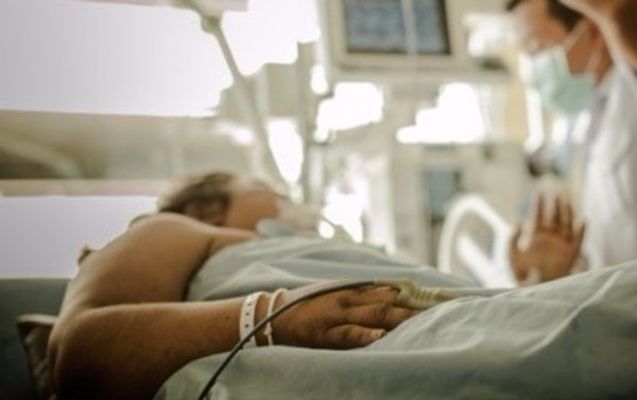5.3.1
The NHS
The Provision of Healthcare in the UK
The Provision of Healthcare in the UK
In the UK, healthcare is primarily provided free through the National Health Service (NHS) which is funded by money raised through taxation.


2013 NHS changes
2013 NHS changes
- In 2013, a number of changes were made to the NHS.
- These were the most extensive changes ever made and have proved controversial.
- They include...


CCGs
CCGs
- The formation of Clinical Commissioning Groups (or CCGs), that consists mainly of GPs, hospital doctors and nurses, and local authorities, who took control of NHS spending.
- CCGs were obliged to consider buying healthcare from private companies, instead of exclusively from publicly owned hospitals of other similar public services.


Patient choice
Patient choice
- A stronger emphasis was placed on patient choice.
- This encourages patients to become more involved and gives them more choice over their treatment, including when and where it takes place, regardless of who provides it.
Problems with Patient Choice
Problems with Patient Choice
In 2013, a number of changes were made to the NHS, one of which was a stronger emphasis being placed on patient choice.


Knowledge
Knowledge
- Most people lack the knowledge and expertise to make choices between hospitals, forms of treatment and other important decisions.
- This can be particularly difficult with patients from disadvantaged groups.


Education
Education
- Richer, more educated groups are often better placed to make informed decisions and are more likely to have better access to high quality information.


Deference
Deference
- There isn’t always a clear cut choice in healthcare decisions, including the risks involved and the outcomes of different treatments.
- Therefore patients might not trust their own judgments and defer to medical professionals to make the choice for them.
Criticisms of the 2013 NHS Changes
Criticisms of the 2013 NHS Changes
Those who were opposed to the 2013 changes, including medical health professionals, public health officials, patient groups and member of the public, raised a number of concerns, including:


Marketisation
Marketisation
- Many were concerned that the changes were leading to the privatisation and marketisation of healthcare, with many services being provided by private companies who market their services.
- This would lead to the most advantaged groups in society benefitting the most.


Competition
Competition
- There would be growing competition between NHS hospitals and private hospitals for patients.
- There are concerns that the private sector would only bid to take on the most straightforward, simple cases, leaving NHS hospitals to deal with the more complex and expensive operations.


Range of services
Range of services
- NHS hospitals would no longer be offering a full range of services, as some would only be available in private hospitals or clinics which might not be available in some areas.


Prioritisation
Prioritisation
- NHS hospitals would be free to treat private patients first and there would be no limit on the number of private patients in NHS hospitals, possibly leading to NHS hospitals prioritising private patients.


Two-tier health service
Two-tier health service
- Waiting lists for NHS treatments could become longer, because private, wealthier patients would get priority.
- There would no longer be a comprehensive and free health service across the whole of the country leading to growing inequality and a two-tier health service.
1Theory & Methods
1.1Sociological Theories
1.2Sociological Methods
2Education with Methods in Context
2.1Role & Function of the Education System
2.2Educational Achievement
2.3Relationships & Processes Within Schools
3Option 1: Culture & Identity
3.1Conceptions of Culture
3.2Identity & Socialisation
3.3Social Identity
3.4Production, Consumption & Globalisation
4Option 1: Families & Households
4.1Families & Households
4.2Changing Patterns
4.3The Symmetrical Family
4.4Children & Childhood
5Option 1: Health
5.1Social Constructions
5.2Social Distribution of Healthcare
5.3Provision & Access to Healthcare
5.4Mental Health
6Option 1: Work, Poverty & Welfare
6.1Poverty & Wealth
7Option 2: Beliefs in Society
7.1Ideology, Science & Religion
7.2Religious Movements
7.3Society & Religion
8Option 2: Global Development
8.1Development, Underdevelopment & Global Inequality
8.2Globalisation & Global Organisations
8.3Aid, Trade, Industrialisation, Urbanisation
9Option 2: The Media
9.1Contemporary Media
9.2Media Representations
10Crime & Deviance
10.1Crime & Society
10.2Social Distribution of Crime
Jump to other topics
1Theory & Methods
1.1Sociological Theories
1.2Sociological Methods
2Education with Methods in Context
2.1Role & Function of the Education System
2.2Educational Achievement
2.3Relationships & Processes Within Schools
3Option 1: Culture & Identity
3.1Conceptions of Culture
3.2Identity & Socialisation
3.3Social Identity
3.4Production, Consumption & Globalisation
4Option 1: Families & Households
4.1Families & Households
4.2Changing Patterns
4.3The Symmetrical Family
4.4Children & Childhood
5Option 1: Health
5.1Social Constructions
5.2Social Distribution of Healthcare
5.3Provision & Access to Healthcare
5.4Mental Health
6Option 1: Work, Poverty & Welfare
6.1Poverty & Wealth
7Option 2: Beliefs in Society
7.1Ideology, Science & Religion
7.2Religious Movements
7.3Society & Religion
8Option 2: Global Development
8.1Development, Underdevelopment & Global Inequality
8.2Globalisation & Global Organisations
8.3Aid, Trade, Industrialisation, Urbanisation
9Option 2: The Media
9.1Contemporary Media
9.2Media Representations
10Crime & Deviance
10.1Crime & Society
10.2Social Distribution of Crime
Unlock your full potential with Seneca Premium
Unlimited access to 10,000+ open-ended exam questions
Mini-mock exams based on your study history
Unlock 800+ premium courses & e-books